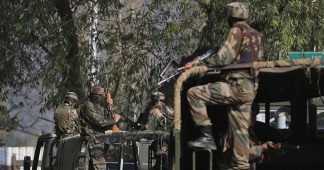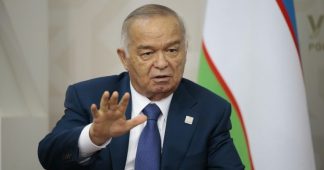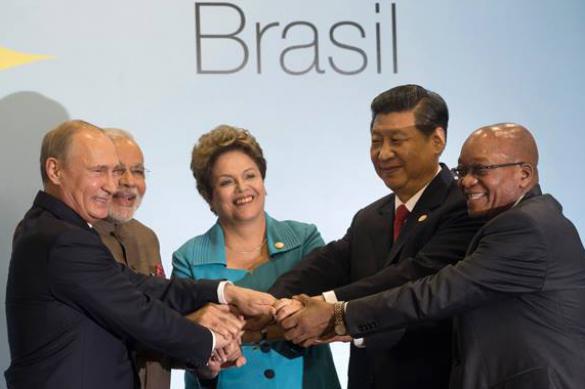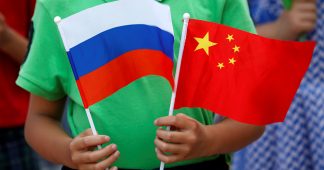By Tayyab Baloch
Moscow has formulated trilateral mechanisms aimed at seeking regional stability through solving the Afghanistan crisis with the help of regional neighboring countries. Indeed, stability in the region is directly connected with peace in Afghanistan. Unfortunately, NATO troops under the umbrella of the USA have provoked hostility in Afghanistan against regional powers and positive integration. Continuous American attempts to sabotage the peace process have persuaded Russia to come forward and seek alternative solutions bypassing the USA and NATO. Firstly, President Putin’s envoy for South Asia, Zamir Kabulov proposed a trilateral talk format between Russia, China and Pakistan and now, after the emerging India-Afghanistan front against Pakistan and their attempt to blame Pakistan for terrorism in Amritsar on the occasion of Heart of Asia conference, Russia is also interested ing forming Russia-India-Afghanistan trilateral mechanisms to minimize obstructions on the way to regional integration. Here it is also necessary to mention that Russia has already accelerated the RIC (Russia-India-China) trilateral mechanism to pull these two Asian economic giants together trough minimizing their disputes.
ISIS Rising and the Blame Game in Region
In fact, the rise of the Islamic State (ISIS) in Afghanistan has become nerve-racking for the whole region, because history has witnessed that the American presence in Iraq crafted ISIS in the Middle East. At the same time, they are using the hostile situation in Afghanistan to strengthen Lashkar e Khorasan. The Pentagon created the jihadist dogma intended to establish Wilayah Khorasan as a province of the Islamic State in the homeland of the Shanghai Cooperation Organization.
The growing influence of the Islamic State in the heart of Asia has become a threat to the regional integration which is under construction by the emerging multipolar world. Afghanistan as an ancient Silk Road country becomes very important for China as part of Xi Jinping’s vision of the modern Silk Road. Thus, peace in Afghanistan has become Russia’s priority aimed at boosting Eurasian Integration towards South Asia via Afghan transit trade routes. Although both multipolar world leaders have succeeded in arranging alternatives for positive regional integration by passing Afghanistan, the war in Afghanistan remains the main reason for instability in the region. Foreign military boots and militancy on Afghani soil have turned Afghanistan into a buffer zone between the Commonwealth of Independent States (CIS) and South Asia. Whereas Pakistan is China’s partner as part of the modern Silk Road strategy, it has become the political victim of India on accusations of terrorism. The Modi government in India is giving all efforts to isolate Pakistan by projecting it as the mothership of terrorism. Recently, the Indian-hosted BRICS summit in Goa and the Heart of Asia conference in Amritsar exposed Modi’s blame game on Pakistan.
Although terrorism was once a state asset of Pakistan, later the situation changed when Pakistan adopted a U-turn by launching a military operation against regional terrorist groups. After 9/11, Pakistan not only withdrew its support for the Afghani Taliban, but also closed all jihadi training camps of the Kashmiri Mujahidin which were involved in the fight against India in Indian occupied Kashmir. Pakistan even plugged up all funding resources of the terrorists, as a result of which they turned around and waged war on Pakistan. But some elements within the Pakistani establishment have introduced a “good-and-bad Taliban policy” which damaged Pakistan’s sacrifices in the war on terror. Pakistan’s “pick-and-choose” policy regarding terrorists is highly criticized within the country and has caused a rift between the government and military establishment. America and Afghanistan are continuously pressuring Pakistan to launch military operation against the Haqqani network, which is allegedly involved in terrorist activities in Afghanistan.
This is the main reason for Afghanistan’s tilt towards India against Pakistan. Therefore, Afghanistan has not only joined the Indian blame game but has also launched propaganda through blaming Lashkar e Taiba and Jaish e Mohammad for militancy in Afghanistan. These groups are banned in Pakistan and never took part in any activity in Afghanistan, but these were only involved in Kashmir. Hence why Afghanistan has failed to provide evidence of these groups’ involvement in Afghanistan.
This India-Afghanistan front against Pakistan is involved in terrorist activities in Pakistan as Pakistani authorities allegedly blamed India for using Afghan’s soil for terrorism in its country, especially in Balochistan. Unfortunately, this situation has become favorable for non-state actors like the Islamic State of Khorasan and Islamic extremist groups. Russia has repeatedly warned both Pakistan and Afghanistan against the growing influence of ISIS but unfortunately both have ignored the Russian warning, as a result of which many separatist groups, after the continuous work of CIA contractors in Afghanistan, joined ISIS.
Russia’s front against Regional Militancy
Russia who has appeared on the world stage as a peacekeeper and won significant successes against terrorism by eradicating the Islamic state supported by the US and its Gulf partners with the timely military intervention assisting the legitimate government of Syria. Syrian forces, with the backing of the Russian Armed Forces, have recaptured Syria from terrorist groups. Syrian people consider Aleppo the second capital of Syria after Damascus. Complete successes in Aleppo will not only reshape the future of united Syria, but will also help Russia to eliminate Islamic terrorism from the world, which was created and sponsored by the Pentagon with the aid of Saudi Arabia aimed at using Islamic terrorist groups for geopolitical objectives. Therefore, Russia is giving every effort to nip the evil (ISIS) in the bud so that world peace can be secured.
There is no doubt that Russia is fighting the SCO’s war on ISIS in Syria because ISIS is considered a potential threat to the homeland of SCO.
Afghanistan, Pakistan, and Central Asian states were on the target list of ISIS. In ISIS literature, these territories, including China’s Xinjiang, can be seen as “KHORASAN”, a branch of the Islamic State. History has witnessed how the US intervention in Iraq created ISIS in the Middle East, and now the same policy has been adopted by the US in Afghanistan to prevent regional integration via creating ISIS militants. Therefore, Russia has urged Pakistan and Afghanistan to take strict measure to prevent the growing influence of ISIS. The Russian presidential envoy to Afghanistan, Zamir Kabulov, once said in April that there are now 10,000 ISIS fighters in Afghanistan. A year ago, there was a hundred. This growth over a year is spectacular.
“The Afghan branch of ISIS is definitely specialized against Central Asia. Russian is even one of their working languages,” Kabulov added. “They are being trained against Central Asia and Russia.”
Thus, the dramatic increase of ISIS terrorists in Afghanistan indicates that US-led NATO is deliberately exporting this new form of militancy to Afghanistan to contain Russia and China in this region. Washington under the Obama administration presented Russia and China as an imaginary threat to Europe and Asia.
Russia has not only exposed the Americans’ so called “war on terror” but has now geopolitically taken charge of eliminating terrorism for a better and prosperous world. Therefore, from Syria to Afghanistan, Russia is determined to seek alternative peace solutions with the help of regional countries.
Regional Security: SCO and CSTO initiatives
Sino-Russian strategic partnership has shaped the Shanghai Cooperation Organization as a safeguard of strategic and economic interests of the region. In one article entitled “NATO challenges SCO and CSTO in Afghanistan”, the writer discusses in detail how NATO’s presence and rising ISIS have posed a great threat to the Eurasian Silk Road developmental projects. Hence why all regional countries under the umbrella of SCO are trying to seek peaceful solutions to Afghanistan’s conflict, because Afghanistan has observer status in the Shanghai organization. For this purpose, the Regional anti-terrorist structure (RATS) of SCO has been established between the member states Russia, China, Kyrgyzstan, Tajikistan, and Uzbekistan while Pakistan and India will soon be added to this regional anti-terrorist structure.
According to the RAT SCO briefing of the counter-terrorism committee of the UN security council, “SCO Member States currently are facing new threats and challenges, including the involvement of foreign terrorist fighters who are nationals of SCO Member States in conflict zones abroad, in particular in Syria, Afghanistan, and Pakistan; incitement to terrorism and violent extremism through abuse of religious concepts; and financing of terrorism through proceeds from organized crime, including smuggling and trafficking of drugs and weapons. In this regard, RATS SCO has identified priority spheres for its actions to tackle these challenges and has already achieved some tangible results. For example, the Executive Committee of RATS SCO has collected information regarding fighters who participated in armed conflicts in Syria and other areas and listed them in its secure database”.
Now Russia and China are working to expand the SCO regional anti-terrorist structure into Afghanistan by bringing on board all regional countries and SCO member states.
The SCO has already established a database of terrorist groups while, under the umbrella of Russia, all Central Asian countries have agreed to formulate a single list of terrorist groups on the platform of Collective Security Treaty Organization (CSTO) which counts as a sister organization of SCO. Both organizations are working to prevent the filtration of terrorists from Syria and Afghanistan to Xinjiang, Tajikistan, Pakistan, and other regional countries.
In fact NATO’s sponsored Turkmenistan-Afghanistan-Pakistan-India (TAPI) gas pipeline has become a trap for the region because NATO needs and wants a new enemy (ISIS) so that it can obtain security contracts for this transnational pipeline. According to available data, the US wants to acquire Turkmenistan’s Mary airbasefor the security of TAPI. The Mary airbase is one of the biggest airbases in central Asia built by USSR. American presence at this airbase would be unaffordable for energy-rich Caspian Sea countries.
CSTO, including Afghanistan, which has observer status of this Central Asian powerful military alliance, has proposed multilateral cooperation with NATO on the Afghanistan issue under the flagship of Russia. But, unfortunately, NATO rejected CSTO’s proposal for cooperation as it has adopted aggressive behavior against Russia and its allies in the region. The Russian presidential envoy to Afghanistan, Zamir Kabulov, told Russian media that the issue of cooperation between NATO and the Collective Security Treaty Organization (CSTO) in Afghanistan is off the table, despite the increasing threat from the Islamic State.
“The topic can be considered closed, and not by our initiative. It is NATO who refused to cooperate with CSTO. The fact is that this region is a part of the larger Eurasian region, and we understand that neither the Americans nor NATO can do the work for us,” Kabulov, who also heads the Russian Foreign Ministry’s Second Asia Department, told RIA Novosti.
Since NATO’s refusal, CSTO has adopted alternative ways for seeking stability in Afghanistan by taking precautionary measures to prevent the penetration of ISIS militancy from Afghanistan to CSTO member states. For this purpose, Russia is interested in deploying a CSTO military contingent along the Afghan borders, especially on Tajikistan’s adjacent border with Afghanistan. Russia has also boosted military cooperation with Pakistan to eliminate terrorism in the region.
China, with the assistance of Pakistan, has already engaged in peace talks with theTaliban, but America under the Obama administration constantly derailed the peace-talk process with the Taliban. Therefore, Russia has now stepped forward to introduce alternative peace initiatives for Afghanistan in the larger interests of the region by bringing on board all regional countries with multipolar world blocks, the SCO and CSTO. Russia’s proposed trilateral mechanism of regional countries is also working on seeking solutions to regional conflicts and is expected to bring stability to the heart of Asia.











